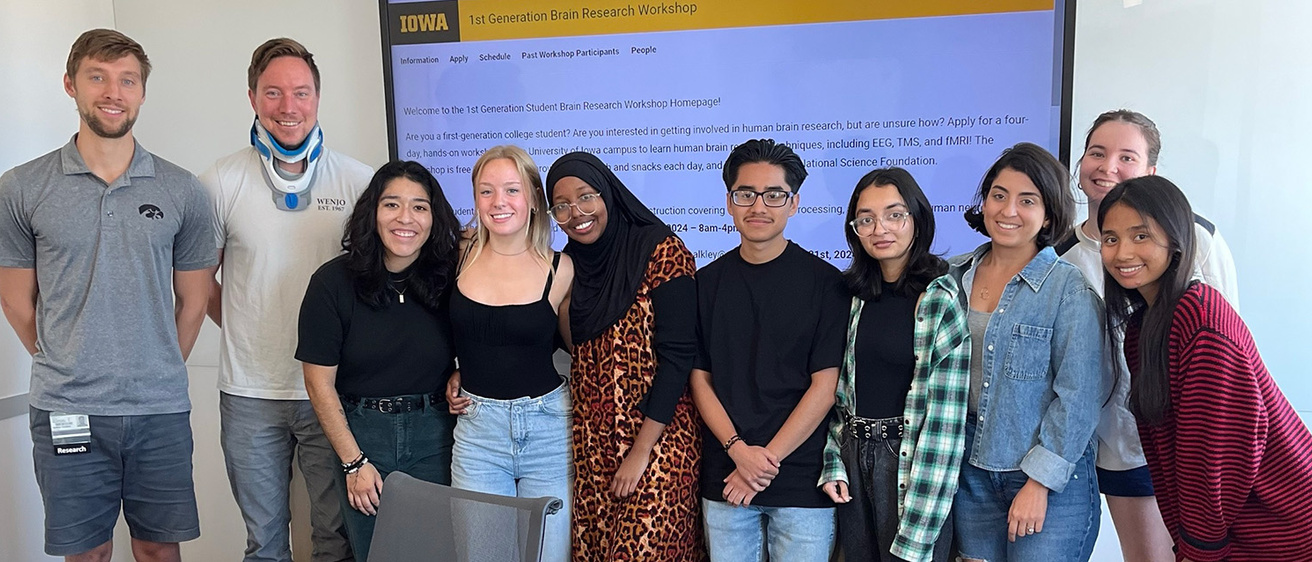First-gen students might come to college unaware of the pathways to research. The University of Iowa offers them support, from educational and networking services to hands-on workshops that deal with brain research.
The top photo...
Jan Wessel (second from left), associate professor and in the Department of Psychological and Brain Sciences and the UI Health Care Department of Neurology, founded and runs the First Generation Brain Research Workshop, a free four-day, hands-on workshop that allows first-generation students to learn human brain research techniques and meet researchers from across campus. Wessel is seen here with the participants of the 2024 workshop. (Photo courtesy of Jan Wessel.)
Story: Emily Nelson
Photography: Tim Schoon
Published: Feb. 22, 2025
Héctor Sánchez Meléndez came to the University of Iowa from Puerto Rico in 2019 with the intention of becoming a doctor.
“I was interested in the brain. I was interested in behavior. So, I thought, you have to be a doctor, right? That was the only thing I knew,” says Sánchez Meléndez, who graduated from Iowa in 2023 with a BS in neuroscience. “I hadn’t really been exposed to what it means to be a scientist or how to get there.”
Today, Sánchez Meléndez is not a doctor, but the first-generation student holds a bachelor’s degree in neuroscience and performs full-time research at the National Institutes of Health in Bethesda, Maryland, through its postbaccalaureate program. He also is applying to graduate schools and eventually hopes to return to Puerto Rico to start a research lab.
Research opportunities and resources on the UI campus — the First Generation Brain Research Workshop and the Iowa Sciences Academy, for example — played pivotal roles in Sánchez Meléndez’s career arc.
“I don’t have a scientist in my family, and if you don’t know those careers exist, you don’t know they exist,” Sánchez Meléndez says. “I’ve talked to fellow students whose parents are doctors or scientists. It’s probably a little different for them because they already know about these things. And it’s good that they can take advantage of those resources.
“But it’s important to have resources for people who might not know about these things, people from different backgrounds who can contribute a lot to science. I’m really fortunate that I found those at Iowa.”
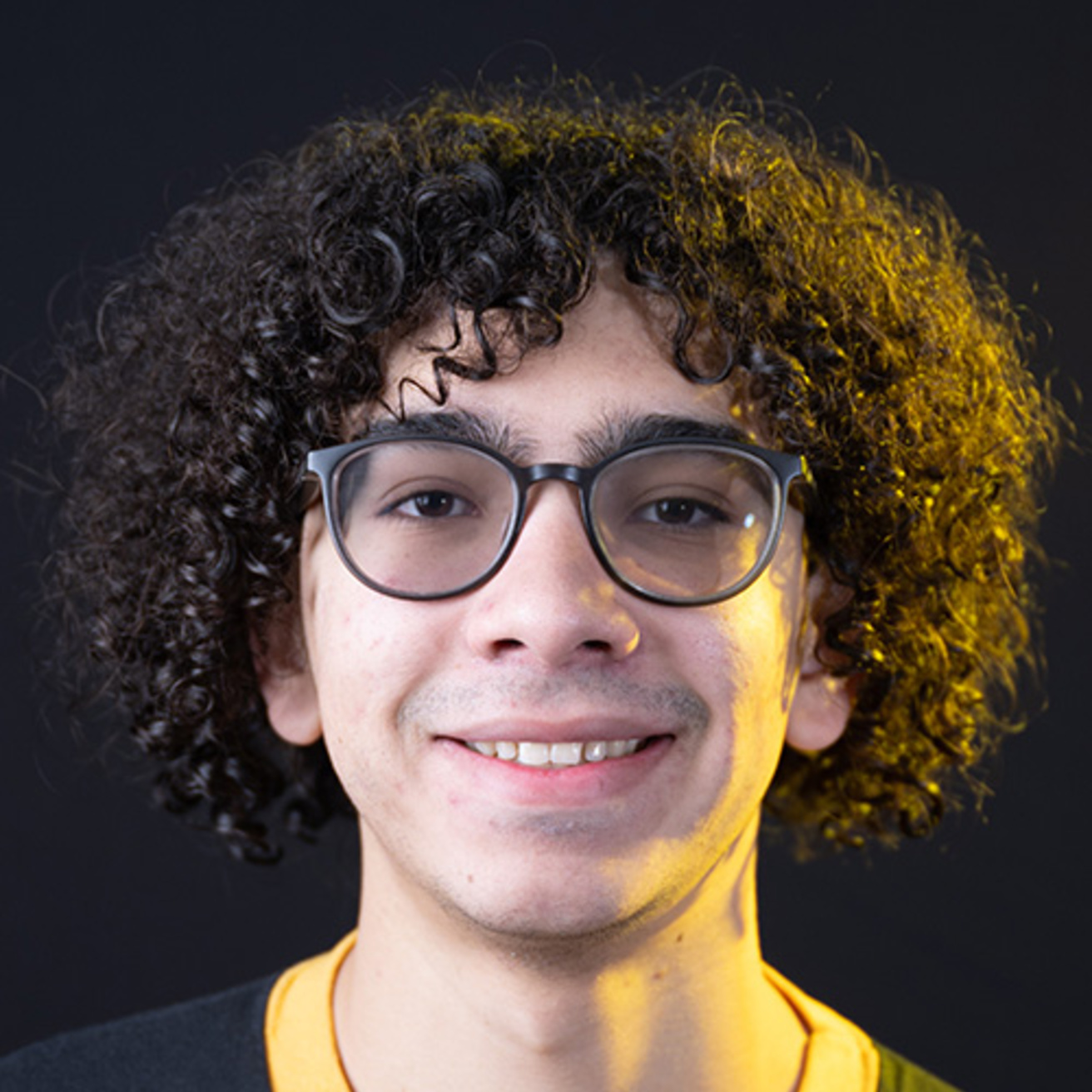
Héctor Sánchez Meléndez
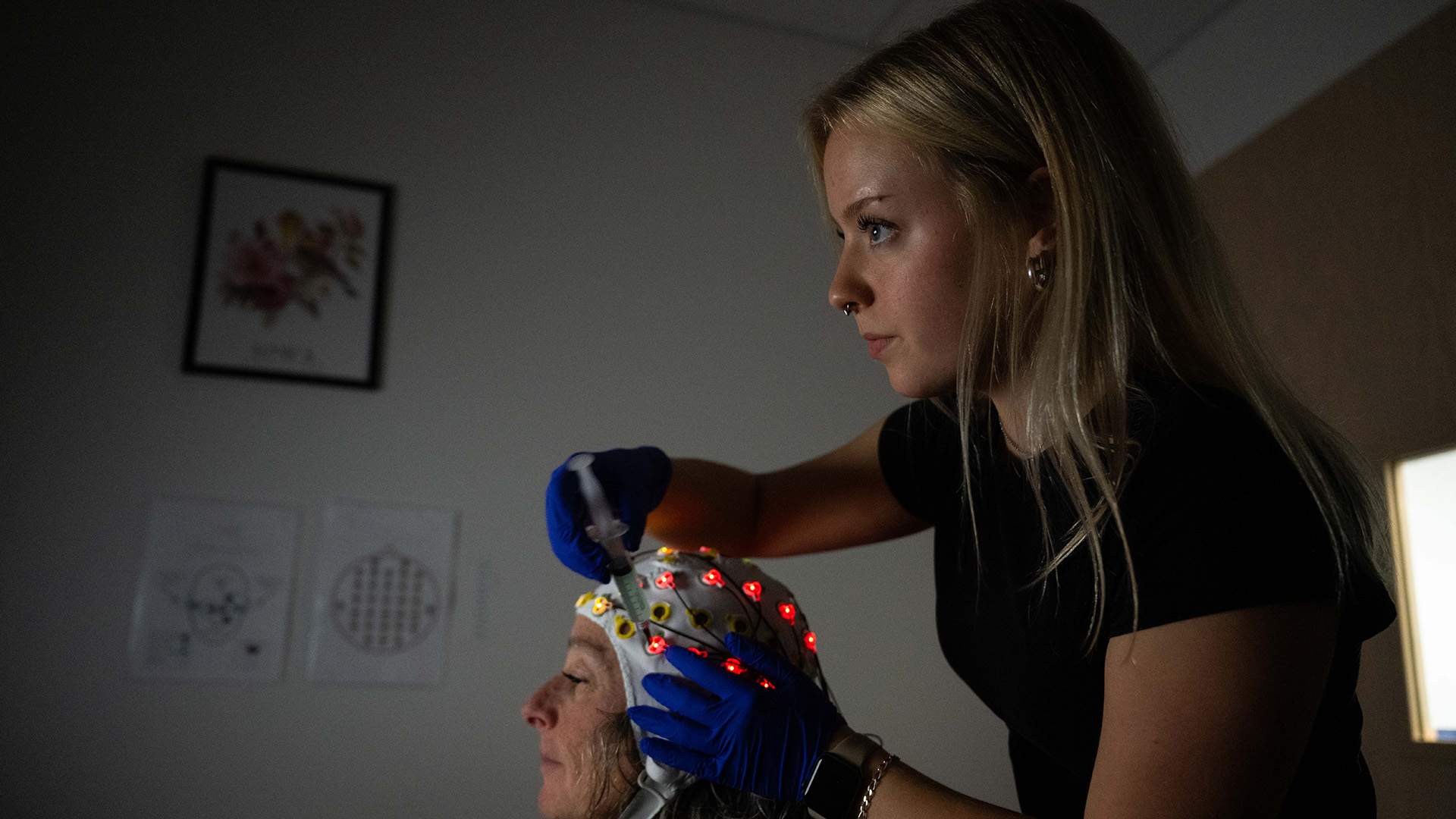
Bailee Kamerzell, who participated in the First Generation Brain Research Workshop in August 2024, now works in the SCANlab (Social Cognitive and Addiction Neuroscience Lab), led by Bruce Bartholow, professor and Ketchel Family Chair, which is working to better understand the origin of addiction and provide research for early intervention.
Workshop introduces first-gen students to research
According to the National Association of Student Personnel Administrators, fewer first-generation college students conduct research projects with faculty members than do continuing-generation college students.
The UI defines as first-generation any student whose parents or guardians have not completed a four-year degree, and in fall 2024, that applied to one in five undergraduates at Iowa.
One resource developed to address the underrepresentation of first-generation students involved in research is the First Generation Brain Research Workshop.
Founded and run by Jan Wessel, associate professor and Ronnie Ketchel Faculty Fellow in the Department of Psychological and Brain Sciences and the UI Health Care Department of Neurology, the free four-day, hands-on workshop allows first-generation students to learn human brain research techniques and meet researchers from across campus.
Wessel, a first-generation college student himself, says he started the workshop because he knows that such experiences can change a person’s life. While Wessel was an undergraduate psychology student in Cologne, Germany, a professor approached him about joining her lab as a research assistant.
“Imagine if she didn’t do that and I never found this thing I love?” Wessel says. “I had never met or talked to a scientist. I didn’t know this was a possible career path. I want to ensure that every student has the chance to try this out. And if they don’t become scientists because they don’t like it, that’s fine. But at least it wasn’t because it was just never on their radar.”
Research wasn’t necessarily on Bailee Kamerzell’s radar when she started at Iowa. The second-year student from Sioux City, Iowa, is working toward a BS in psychology and BA in criminology, law, and justice.
“I knew that going into psychology, most people assume you’ll be a counselor or therapist, but I wasn’t sure that I wanted to go on that path,” Kamerzell says. “But I didn’t know what I would do.”
The value of research participation
Participating in undergraduate research is considered a high-impact practice and can benefit students in numerous ways, including:
- Enhancing critical thinking and problem-solving skills.
- Improving communication skills.
- Better integrating coursework and real-life experience.
- Contributing to work that positively impacts the community locally and globally.
- Gaining greater knowledge of academic interests and career paths.
Research shows that first-generation students often confront significant obstacles, from accessing higher education to thriving after they have enrolled. Angie Lamb, associate director in Academic Support and Retention, says one challenge can be that they lack the advantage of a parent’s college experience.
“This means they maybe aren’t quite as aware of how to navigate college, including all of the ‘hidden curriculum,’ the sometimes-confusing terms or rituals that occur on campus,” Lamb says. “They’re not able to draw that knowledge from their parent or guardian.”
And some of that knowledge includes understanding that research is a pathway that students can pursue.
“You don’t know what you don’t know. And many students don’t know that these opportunities are there for them,” says Tawny Tibbits, director of the Office of Undergraduate Research. “And even if they do, they don’t necessarily know how to go about finding a research position or how to do the networking to find it.”
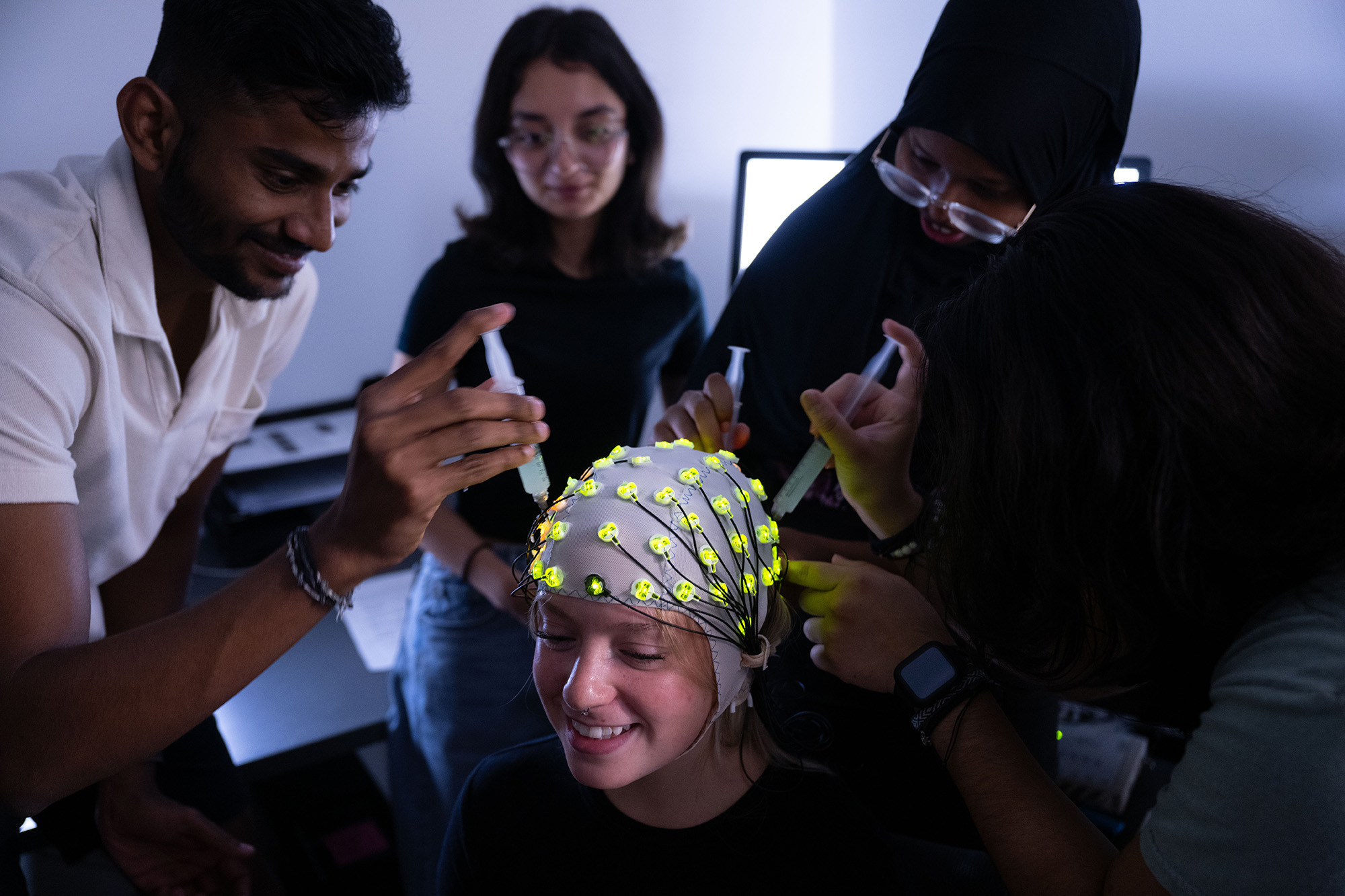
The first three days of the First Generation Brain Research Workshop are spent learning about and using common methods to study the brain, including electroencephalography (EEG).
It was a behavioral neuroscience class her first year at Iowa that first piqued her interest in research. In that same class, Kamerzell found out about Wessel’s first-gen workshop, which she joined in August 2024.
“I wasn’t sure if I’d apply because I knew it would take me out of my comfort zone, but I knew it’s what I needed to do to get on the path that was going to lead me where I thought I wanted to go,” Kamerzell says. “And it was amazing. They gave us so many resources and made us feel comfortable about the fact that we didn’t know everything. I made so many connections that I know will last years after I graduate.”
Most students in the workshop are going into their second or third years of undergraduate study, although some older undergraduates or even graduate students join. The first three days are spent learning about and using common methods to study the brain, including electroencephalography (EEG), transcranial magnetic stimulation (TMS), and functional magnetic resonance imaging (fMRI).
The last day allows the students to meet, network with, and get career advice from researchers in labs across campus.
“That always ends up being a mind-blowing part of the workshop,” Wessel says. “It’s all about explaining how to navigate the academic research environment, saying, ‘Here’s how all of this works and here’s what you can do to be a part of it.’”
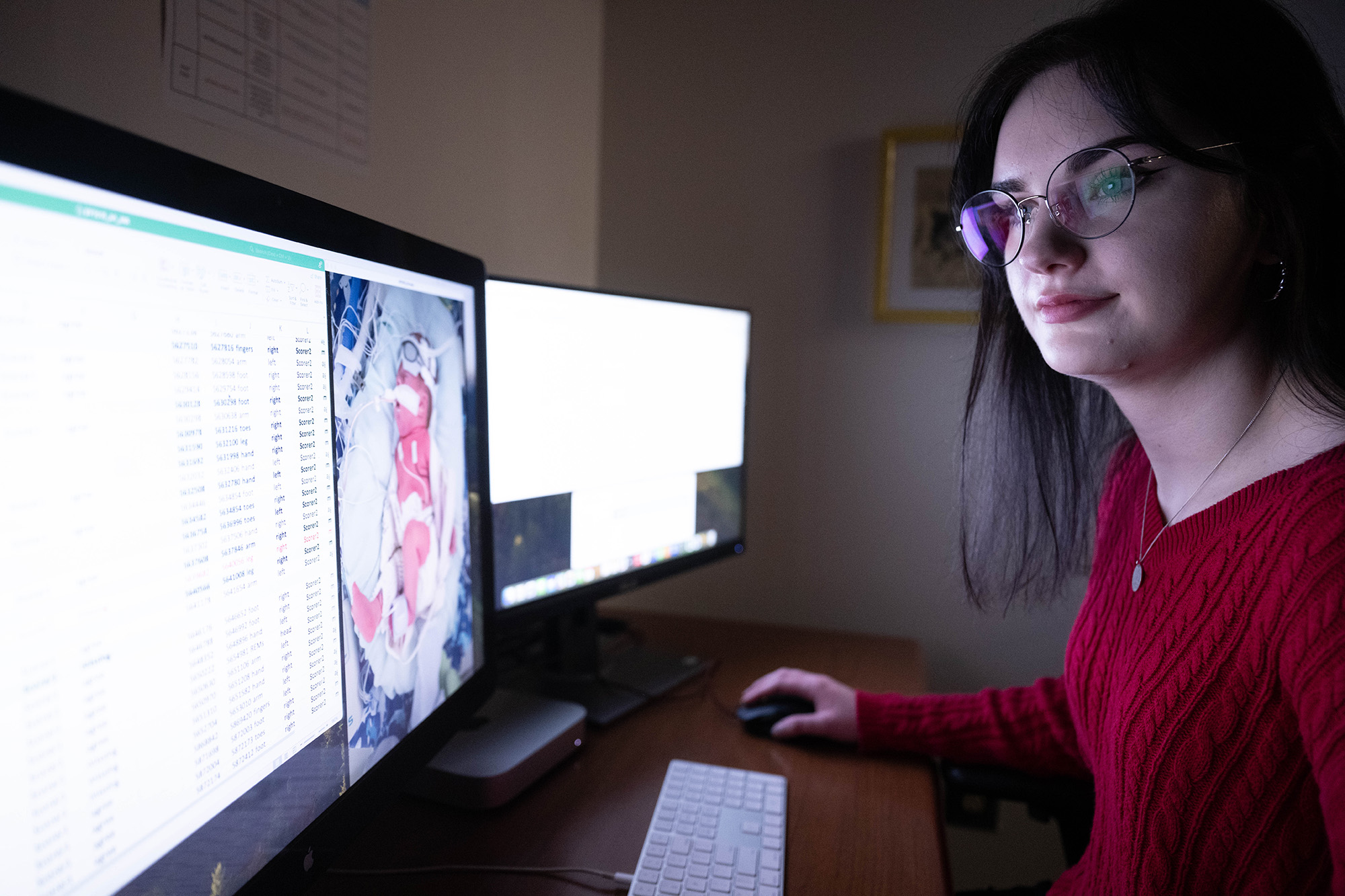
Olivia Kopp, who participated in the First Generation Brain Research Workshop in August 2023, went on to work in the Sleep and Behavioral Development Lab led by Mark Blumberg, professor and chair of the Department of Psychological and Brain Sciences, assisting in the lab’s work to understand how twitches in infants and toddlers during sleep contribute to their development.
Unlike many students, Olivia Kopp knew in high school that she was interested in research — “I chose Iowa because I wanted to go to a research school.”
But that doesn’t mean the Dubuque, Iowa, resident understood exactly what research entailed or how to get involved in it.
“As a first-generation student, it can be very confusing to know who to talk to or how to apply for a research position,” Kopp says. “You don’t have people automatically who can answer those questions. I don’t necessarily think that’s a negative thing, but it is an obstacle. Without having an academic in your family or as a close friend, it’s just hard to know what to do.”
Kopp participated in the First Generation Brain Research Workshop in August 2023.
“It was a great experience because I learned what a research assistant actually does,” says Kopp, who graduated in December 2024 with a BS in psychology. “The workshop gave me the confidence to start applying for research assistant positions — and the knowledge of where to find them.”
First Generation Brain Research Workshop
Are you a first-generation college student interested in getting involved in human brain research but aren’t sure how? Apply for a four-day, hands-on workshop that allows first-generation students to learn human brain research techniques and meet researchers from across campus.
The workshop is free to participants and provides free lunch and snacks each day.
In January 2024, Kopp began working in the Sleep and Behavioral Development Lab led by Mark Blumberg, professor and chair of the Department of Psychological and Brain Sciences. She has been assisting in its work to understand how twitches in infants and toddlers during sleep contribute to their development.
“Research has the ability to really open up your mind because you have to think about one question from all different angles,” Kopp says. “That has really helped me in general with my perspective on any sort of topic. I think that has been the most important skill I have gained working in this lab, even compared to all of the technical skills I have learned.”
Kamerzell, meanwhile, is working in the SCANlab (Social Cognitive and Addiction Neuroscience Lab), led by Bruce Bartholow, professor and Ketchel Family Chair, which is working to better understand the origin of addiction and provide research for early intervention.
She says she thinks her high school self would be shocked to see the work she is doing.
“I never saw myself as someone who would thrive in science, but I’ve proved otherwise,” Kamerzell says. “I love that through research you can get answers to questions. And I definitely have plenty of questions I want answered!”
“Iowa is an especially great college to go to as a first-generation student because they provide so many opportunities for us. My future is anything but limited, and it’s really nice to see that.”
Pairing first-generation students with mentors
Studies suggest that strong connections with faculty members — whether in the classroom, during office hours, or through research projects — make a positive impact on students’ undergraduate experiences. This can be especially true for first-generation students.
To help foster these connections, hundreds of Iowa faculty and staff volunteer to serve as mentors and advocates for first-generation students through the 1stGen@Iowa Mentor Network.
“Our faculty mentors often find mentoring undergraduates a hugely rewarding experience,” says Tawny Tibbits, director of the Office of Undergraduate Research (OUR). “They were all once undergrads who had no idea what they wanted to do or had an idea but didn’t know how to get there and were looking for guidance. So, they really enjoy getting to give back and help students like they were helped, or to be the person that they needed that maybe they didn’t have.”
Providing mentorship and helping students find mentors are goals that Wessel strives for through his First Generation Brain Research Workshop.
“I stress to students that one of the best things you can get out of your college experience is finding somebody who will be in your corner and who will go to bat for you, somebody who’s invested in your career, somebody who you can go to for advice,” Wessel says. “We’re trying to be that for them. We try to find research labs for them. And if they’ve identified a research lab, I try to put in a good word for them. We tell them, ‘If you want us to read your materials for graduate school, let us know. If you want us to put you in touch with a professor, let us know.’”
Sánchez Meléndez says he found several strong mentors thanks to his participation in the workshop in 2021 and appreciates how they helped set him up for success.
“I’m very independent, but independent people still need strong mentors and strong people behind them,” Sánchez Meléndez says. “I don’t have all the answers. Everything I’ve been able to accomplish is partly because I’ve had people who have been there with me every step of the way. Having strong mentors makes you able to reach your goals without having to struggle as much as if you had to do it yourself.”
By the numbers
- 19%: Undergraduates at Iowa who identified as first-generation in fall 2024.
- 23%: First-generation college graduates in the U.S. who participate in a research project with a faculty member, compared with 30% of continuing generation college graduates.
- 14%: First-generation college graduates in the U.S. who had enrolled in a research or professional doctorate program within four years of earning a bachelor’s degree, compared with 24% of continuing-generation college graduates.
Resources, support help put first-generation Hawks on research path
The University of Iowa strives to provide a variety of resources and strategies to support first-generation students in their academic and career endeavors — from planning for college through their first day on campus and beyond.
The First Gen Hawks program provides first-generation Hawkeyes in their first year at Iowa a way to engage in activities that enhance the college experience within and beyond the classroom through experiential learning.
Alison Casella, associate director for the program, says part of the First Gen Hawks curriculum focuses on illuminating all possible paths for students based on their interests.
“Often students will come to us and say, ‘I’m interested in being pre-medicine, pre-dentistry, pre-PA,’ whatever it may be,” Casella says. “We try to help them dig into that and say, ‘OK, what does that actually mean and what do you need to get there?’ They think that they’re interested in pre-med, but could they actually be more interested in the research path than the clinical path? We try to highlight those differences, which can sometimes feel a little bit more nuanced for first-generation students.”
Students can then get an introduction to research at Iowa through spring Discover Research courses, which are a partnership between the Office of Undergraduate Research and First Gen Hawks program.
There are also a number of first-year seminars that focus on research. And while these are open to any first-year student at Iowa, says Angie Lamb, associate director in Academic Support & Retention, they see many first-generation students registering for them.
One obstacle that some first-generation students face in accepting a research position on campus is economical.
“They sometimes have to pick between choosing to work or choosing to get these research experiences,” Tibbits says. “If the research isn’t a paying job, they may have a difficult decision to make.”
To help overcome such barriers, the OUR offers a number of fellowships that provide funding to undergraduate students engaged in research and creative projects.
Wessel appreciates the efforts made on behalf of first-generation students and is proud to contribute to them. In 2022, the 1stGen@Iowa Faculty and Staff Collaborative recognized Wessel’s advocacy and support of first-generation students with one of its annual 1stGen@Iowa awards.
“Everything that the university is doing with the First Gen Hawks program and the 1stGen@Iowa Initiative, I wish any of that would have been available when I was in college,” Wessel says. “Nearly a quarter of our undergraduates are first-generation. I think it’s amazing what this university does for this population.”
“I’m very independent, but even independent people still need strong mentors and strong people behind them. I don’t have all the answers. Everything I’ve been able to accomplish is partly because I’ve had people who have been there with me every step of the way. Having strong mentors makes you able to reach your goals without having to struggle as much as if you had to do it yourself.”
Celebrating first-generation Hawkeyes
Along with supporting the journey of first-generation students, Lamb says it’s important that the university also celebrate them.
“First-gen students are so very resilient and resourceful. They also bring so many different perspectives and experiences to campus, which enriches everyone’s learning experience,” Lamb says. “So, while they do face barriers, being first-gen is not necessarily a detriment or a bad thing. It’s something that we truly want to celebrate.”
Every November, the university joins colleges across the country in honoring the successes of first-generation students through the First Generation College Celebration. Iowa’s 2024 events included first-generation student panels, college- and department-specific get-togethers, and giveaways that allowed students, staff, and faculty to show off their first-gen pride. The university also hosts a 1stGen@Iowa Awards and Recognition Ceremony each spring and provides graduating first-generation students special cords to wear during commencement ceremonies.
“These students are all phenomenal,” Wessel says. “They’re interested and they’re hard workers. They have a lot of skills and abilities that come with being a first-generation student that give them a leg up that they may not be aware of. I think communicating that to them is important. They should see it as a special achievement that they’re doing this as the first person in their family.”
Kamerzell says while it can be challenging at times to be a first-generation student, it also allows for opportunities to grow and achieve things you may never have thought you were capable of.
“Iowa is an especially great college to go to as a first-generation student because they provide so many opportunities for us,” Kamerzell says. “My future is anything but limited, and it’s really nice to see that.”
